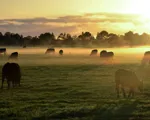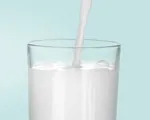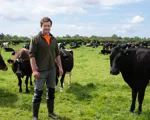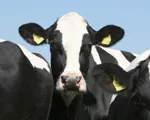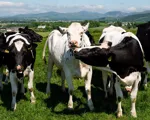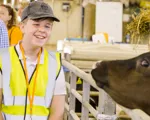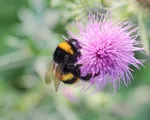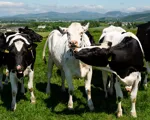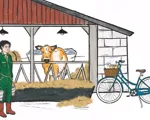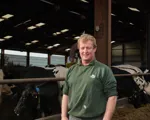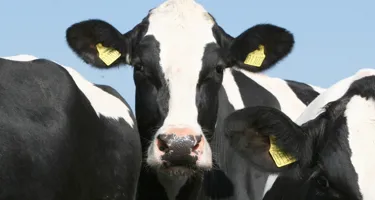
How do gasses and emissions from farming impact the environment? Read our in-depth guide for more information.
Governments and industries across the planet are beginning to change the way they produce goods and services to reduce our global carbon footprint, creating a greener future for the next generation, and to better respect the environment and the ecosystems that it covers.
The farming industry is an important part of this drive for change, and here at Arla sustainability is high up on our agenda. Along with other major industries, farming creates a lot of greenhouses gases that end up in the atmosphere, which is why we’re so committed to improving sustainability and reducing farming’s carbon footprint.
The best place to start with this is to better understand the impact of farming on the environment. We’re going to take a look at the emissions that farms produce and some ways in which we can reduce those emissions and tackle climate change.
How is methane produced from cows?
Cows naturally produce methane as they digest their food in a process called enteric fermentation. Enteric fermentation¹ converts the sugars that the cow consumes into molecules to be taken into the blood stream. This process also produces methane which is then expelled into the air and into the atmosphere.
Methane from cows and other animals in the meat and dairy industry is a big contributor to global emissions. Livestock around the world emit the methane equivalent of around 3.1 gigatonnes² of carbon dioxide into the atmosphere every year, One of the ways we’re working to offset this output is to reduce emissions elsewhere, such as on the roads. At Arla we’ve been making use of the natural waste cows produce to create biofuel for our delivery trucks, creating a closed loop of renewable energy that can eventually be used to power all sorts of things. Find out more about our poo power initiative here.
How does farming produce greenhouse gases?
There are other ways agriculture in general can produce greenhouse gases and pollutants, from the use of machinery to fertilisers, which is why it’s so important to be responsible farmers and minimise impact on the land to ensure it’s healthy and usable for decades to come, as well as minimising any impact on the environment.
For our Arla dairy farmers, this means carefully managing the land for cows to graze as well as providing habitats for other wildlife and plants to thrive.
Does this impact global warming and how do we address this?
Farming certainly has its impact on global warming, which is why it’s so important to understand what we can do to minimise and offset it. For dairy farming specifically, this about making use of all the available sources of energy that would otherwise be wasted, such as our technology for turning cow pats into power, as well as reducing our emissions wherever we can and making our processes more sustainable.
It’s also important to promote the health of the farm’s local environment, such as keep water sources free from harmful chemicals, and providing habits through hedgerows or wild areas in parts of the farm that aren’t suitable for grazing or crops.
Climate smart agriculture³
The farming industry, as part of our drive towards sustainability, is working to new standards of farming for a better climate, known as ‘climate smart agriculture’. The idea of climate smart agriculture is split into three objectives which are increased productivity, enhanced resilience and reduced emissions. Each objective is designed to help farms adapt to reflect the new climate in which we now live, helping them produce more food, be more adaptable to climate change effects and reduce their climate impact. You can find out more about the initiative and what each objective entails on the website of the World Bank.
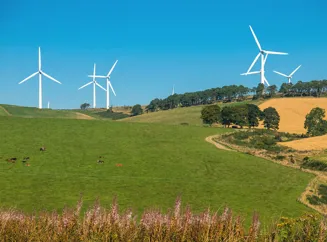
Frequently Asked Questions
How much does methane from cows contribute to global warming?
Cows naturally produce methane as they digest, contributing up to 200kg of methane a year into the atmosphere. However, the methane produced by cows is only a fraction of total global methane emissions After carbon dioxide, methane is the second most abundant gas emitted into the atmosphere by human, though it will exist there for less time.
Do humans or cows produce more methane?
While cows produce more methane than humans as a species, the majority of the current methane output of the globe is normally attributed to human agriculture,⁴ leakage from gas, coal and oil producers and decay in landfill sites and rubbish tips.
This article about methane and climate change has a number of insightful facts and data about our methane output.
Does climate affect agriculture?
Yes – as our climate warms⁵, our farms and our agriculture will need to adapt to rapidly changing issues and to overcome challenges including:
- Water shortages for crops
- Heat waves leading to loss of crops
- Flooding of crop fields
- Higher chance of diseased livestock
- Less suitable farming land available
These are just some examples, but there are many more problems – some which we are yet to discover or experience – that the warming of our planet will raise for farmers across the world.
That was our brief introduction to how farming affects our environment and our climate. For more news and information on how we at Arla are making the way we work more sustainable, explore our blog and our website here.
References:
¹https://climate.nasa.gov/faq/33/which-is-a-bigger-methane-source-cow-belching-or-cow-flatulence/
³https://www.worldbank.org/en/topic/climate-smart-agriculture



